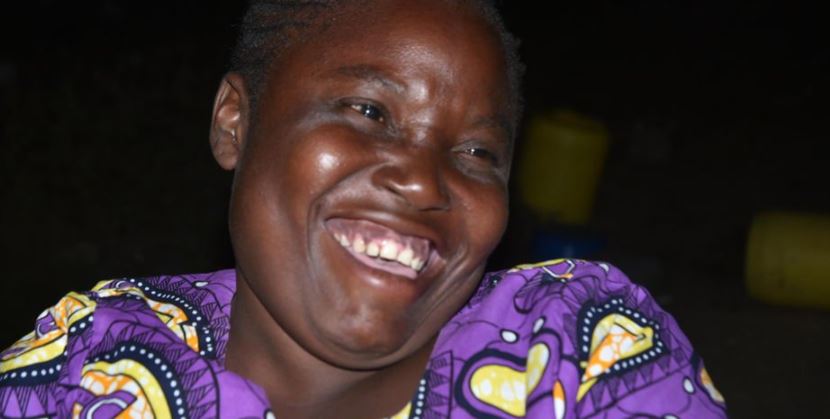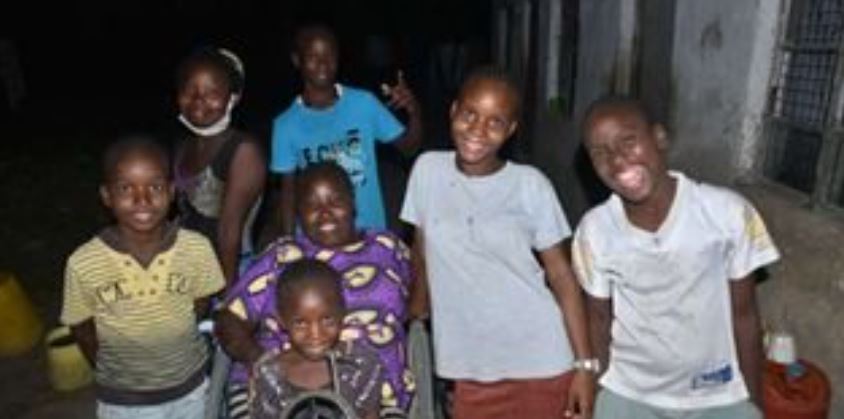
A friend would later introduce the mother of five to a program at the Baptist church under the Compassion survival program, where she did a tailoring course and got a sewing machine. She now runs a tailoring and grocery business.
Here’s her story as published in the Saturday Magazine.
*****************************
“I own a small dress-making business where I have specialised in sewing both women’s and men’s garments at Kazandani area in Mombasa County. I do everything by myself, despite my disability.
This skill has come in handy for me, as apart from bringing me an income; it has ensured that my children are taken care of. I make clothes for customers as well as for my family, including my children’s school uniforms.
I also sell snacks, fruits, and other household items from a shop located a few kilometers from where I live.
I not only get to fend for my family but also save a little. This perhaps may seem effortless for some, but to me, rising from begging to being able to take care of my children without any kind of help is an achievement.
At a young age, I developed polio, a disease that would eventually leave me completely paralysed from the waist down. The condition had me confined to a wheelchair.
Growing up wasn’t easy. First, my disability was considered a curse, making my father walk out on my mother. My mother was left to single-handedly cater to a special needs child.
At first, she took handled all my affairs, and even took me to a special school, but, being still young, she got married and left me under my grandparents’ care.
I transferred to a normal school and due to the bullying and teasing I soon dropped out.
Much later, feeling hopeless, I moved to Mombasa to try my luck but I couldn’t even get a job as a housemaid because of my disability.
That’s when I was introduced to begging. By then I already had four children and begging was not sustainable. I would get a mere Sh100 or even sometimes go home empty-handed, after a long day in the scorching sun.
I got my periods very late, and people speculated I was abnormal. To prove them wrong, I started having sex, leading me to get pregnant.
Back to life on the streets, my children joined me to beg, but the money was never enough. Things got even worse when I got pregnant with my fifth child. I was so afraid and kept wondering what I would do with another mouth to feed. What made matters worse, I developed complications in my third trimester, and I could neither afford treatment nor go out to beg.
In the eighth month of my pregnancy, a friend introduced me to this program at the Baptist church under the Compassion survival program.
Apart from getting health care, I received my tailoring skills, as well as got a special sewing machine.
I attribute my modest success to this training, but I’d like to believe that were it not for my zeal and determination, perhaps all this would have gone to waste.
I traveled 10 km daily for two years for the training. Afterward, I set up my tailoring business.
Today, I command respect from my family, neighbours, and relatives.
This is not devoid of challenges. The biggest setback has been financial hardships, especially during these pandemic times.
That’s nothing, however, compared to having to deal with the misconceptions about people living with disabilities. Initially, when I started my grocery business, I would get chased from the market, where I went to get produce, as they thought I was a beggar. I would be forced to show the traders money first. It’s also a struggle to get the best fresh produce as I get shoved by full-bodied people.
A strong support system, from the church and other disabled people, has contributed to my success.
But my greatest support comes from my children. They are aged between five and 16 and they help with all the house chores and sometimes the businesses. I was able to run both my businesses during the pandemic due to their help.
There are times I sense that my children feel disadvantaged, especially when sometimes I’m unable to give them what they want, but mostly they’re contented with whatever little we have.
We are very close and if you see us for the first time you’d think we are siblings. They accept me as I am. I’ve heard stories of children who are ashamed of their disabled parents, but I’ve never witnessed this.
As a parent, there are times I’m required to instill some discipline in them, and when need be, I do it without fear, hesitation, or apology.”
source http://nairobiwire.com/2021/01/my-story-from-a-paralysed-street-beggar-to-a-respectable-business-owner.html

No comments:
Post a Comment